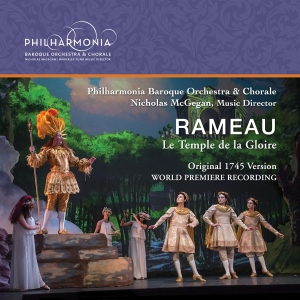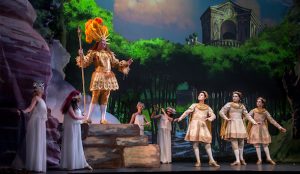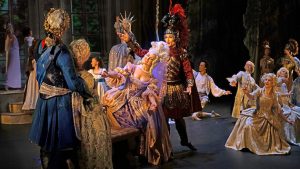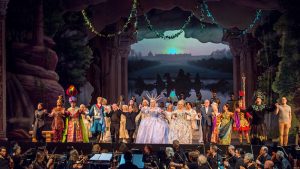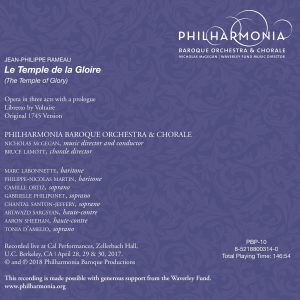ORIGINAL OPERA SHOULD BE SEEN,
NOT JUST HEARD
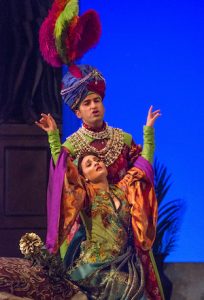 I suspected even before opening this new recording that there was trouble ahead on what should have been a fascinating effort. The “world premiere recording” of the “original 1745 version” of Jean-Philippe Rameau’s Le Temple de la Gloire is a must for the collector (and you know who you are, French baroque opera lovers), but newcomers to this art form may find the 2017 live recording rather repetitive and a bit tiresome. In addition, stage sounds, a few noisy audience members, sound level problems, and very loud applause interrupts the flow of some magnificent playing by the great Nicholas McGegan and his Philharmonia Baroque Orchestra, with the magnificent Chorale led by Bruce Lamott. The 2 discs were recorded live in 2017 at Zellerbach Hall in Berkeley, CA: Given the extraordinarily gorgeous photos of the beautifully staged production seen in the extravagantly well-made and classy booklet, I can only surmise that had this been a release on DVD instead of CD, it would have been far more enjoyable.
I suspected even before opening this new recording that there was trouble ahead on what should have been a fascinating effort. The “world premiere recording” of the “original 1745 version” of Jean-Philippe Rameau’s Le Temple de la Gloire is a must for the collector (and you know who you are, French baroque opera lovers), but newcomers to this art form may find the 2017 live recording rather repetitive and a bit tiresome. In addition, stage sounds, a few noisy audience members, sound level problems, and very loud applause interrupts the flow of some magnificent playing by the great Nicholas McGegan and his Philharmonia Baroque Orchestra, with the magnificent Chorale led by Bruce Lamott. The 2 discs were recorded live in 2017 at Zellerbach Hall in Berkeley, CA: Given the extraordinarily gorgeous photos of the beautifully staged production seen in the extravagantly well-made and classy booklet, I can only surmise that had this been a release on DVD instead of CD, it would have been far more enjoyable.
Zellerbach Hall is at the University of California at Berkeley, which owns an original manuscript of this opéra-ballet, which was first performed at Versailles on November 27, 1745. Baroque stage works had many names including ballet héroïque, tragédie lyrique and acte de ballet. Basically, aside from length, all of these various genres consist of the same thing: a series of dances and vocal scenes arranged to illustrate a plot drawn from classical mythology. Rameau was the greatest composer of these opera/ballet combinations, and his dance music was so successful that orchestral suites of dances taken from the larger works have always been popular, even in his own lifetime (McGegan recorded on Harmonia Mundi some Rameau orchestral suites back in 1995.)
Here, there’s a Prologue, in which Envy (baritone Marc Lebonnette) assaults the Temple of Glory, but he is trounced and chained up by Apollo (amazing countertenor Aaron Sheehan) and his forces. In the first of three acts, the cruel King Bélus (baritone Philippe-Nicolas Martin) is not allowed to enter the temple, and the partying Bacchus (comic countertenor Artavazd Sargsayan) is denied admission in the second act. Since Le Temple de la Gloire was created to celebrate Louis XV’s victory at the battle of Fontenoy, Voltaire’s libretto likens his king with the Roman Emperor Trajan (Mr. Sheehan), whose numerous conquests — and magnanimous ways on the battlefield — permit him entry into The Temple of Glory in the third act, after which Trajan asks La Gloire (baritone Marc Labonnette) to turn it into le temple du bonheur public (the temple of public happiness).
“Public Happiness,” to Louis, was no doubt unbefitting to a monarch who deserved Glory and most certainly would not be told of morals and governance (an attitude that no doubt helped to fuel the French revolution two generations later), so his icy glare after the performance and reported contempt of Voltaire caused the satirist to revise his work the next year in 1746. It is also said that substantial changes by Rameau took into account the Parisian public’s aversion to moral maxims, and their preference for love scenes. The 1746 version is the one that has been staged and also recorded a few times. Thus, what we have here is a world premiere recording reconstructed from the original libretto.
With a cast made up of 90% French singers who had worked at the Centre de Musique Baroque de Versailles, McGegan spearheaded this production to show how this opera-ballet would have looked to French audiences at the time of its 1745 premiere, with baroque-style sets, baroque-style costumes, baroque-style ballet, and baroque-style movement — none of which we get on the CD. Certainly we get singers with perfect French and terrific trills (along with the previously mentioned haute-contres, sopranos Chantal Santon-Jeffrey, Camille Ortiz and Gabrielle Philiponet are standouts), but there’s an unevenness in vocal talent that usually accompanies live opera recordings. Still, this fluffy listen (87 tracks!) and its astounding packaging is a must-have for aficionados.
production photos by Frank Wing / Cal Performances
Le Temple de la Gloire (Rameau and Voltaire)
Philharmonia Baroque Orchestra & Chorale, Nicholas McGegan
PBP Records | 2 discs | 87 tracks | 146:20 minutes | released July 13, 2018
available at Amazon, iTunes, and Philharmonia
